What could the future of leadership look like if we viewed it through the eyes of the next generation?
And how might our understanding of leadership evolve if we listened to this generation more closely?
Recently, I had the chance to speak at Career Day at my daughter’s high school in Queens, New York - Townsend Harris High School. And I thought this is the perfect opportunity to hear from these young people and their views on leadership. So I brought my microphone, and I asked them three questions:
What’s one quality every leader should have?
What’s a leadership myth you think isn’t true?
If you could lead one change in the world, what would it be and what would you do first?
You’ll get to hear their responses in the next episode on Transformative Leadership Conversations.
All of this inspired me to dedicate this month’s podcast theme to How the Next Generation Views Leadership.
Today, we’ll explore how our future leaders – specifically Gen Zer’s - think about leadership from two angles:
What do they want from their leaders at work?
How do they imagine themselves as leaders?
In next week’s episode, you’ll hear directly from those students in Queens, and I’ll unpack their answers alongside commentary from my daughter, exploring what their perspectives mean for all of us.
And in the final episode of this series, I’ll talk with Lorraine Connell—a former chemistry teacher turned teen leadership coach and founder of Peers Not Fears, an organization dedicated to developing leadership in youth through peer mentoring.
But let’s first step back to understand the broader context: What has shaped Gen Z’s views of leadership?
Gen Z typically includes individuals born between 1997 and 2012—so in 2025, they’re between the ages of 13 and 28. But a lot has happened in the world since 1997 so it’s important not only to consider their limited exposure to leadership but also the unique and turbulent context they’ve come of age in.
To put that into perspective, I asked ChatGPT to compile a list of major global events from 1997 to 2025. I’ll include the full list in the show notes, but here’s a quick snapshot:
4 major economic crises – e.g., the 2008 global financial crisis
5 breakthrough tech innovations – e.g., the iPhone’s debut in 2007
4 major public health crises – including COVID-19 in 2020
5 major social movements – like Black Lives Matter (2013) and MeToo (2017)
9 major natural disasters / environmental disruptions – e.g., Hurricane Katrina in 2005
15 significant political upheavals / global conflicts and wars – e.g., Russia/Ukraine and Israel/Gaza
This is the water Gen Z has been swimming in.
Of course every generation has lived through big changes. But growing up in an era where instability feels constant, this fundamentally shapes how they – and we – see the world—and how we think about leadership. These tsunami of constant change can create uncertainty, erode trust, and it can feel like there’s not a firm foundation to build on.
For many Gen Zers, there’s a persistent sense of: “I can’t count on things being stable.”
This experience and subsequent mindset—shaped by the world they’ve inherited—inevitably influences what they want and need from leaders today.
To dig into this a bit more, there are three recent studies shedding light on the leadership perspectives on Gen Z:
Seton Hall University’s 2024 Future of Leadership Survey, and
a 2025 academic paper in the European Journal of Business and Strategic Management
which provides specific insights into how Gen Z views leadership and what they expect from those in charge.
So, what does the research tell us?
Across the board, Gen Z wants leadership that builds trust, is willing to show vulnerability (including admitting mistakes), they want leadership to empower others, and they want leaders to have a learning mindset.
Trustworthiness consistently ranked at the top of what Gen Z wants from their managers. This is a big theme. Also interesting is that despite the widespread belief that Gen Z craves purpose-driven work, both the Deloitte and Seton Hall studies found that “purpose” ranked lower on the list of leadership values in favor of prioritizing financial security.
Why? One theory is that years of financial and societal instability have made security, clarity, and growth much more pressing.
Another study from the European Journal of Business and Strategic Management found that strategic leadership—defined by clear vision, open communication, and inclusion—has a direct, positive impact on Gen Z motivation and performance.
So in other words, when leaders involve this generation of employees in meaningful decision-making, they respond with higher engagement and productivity.
Now, this shouldn’t be surprising! Because who doesn’t want that?
But it might be suggesting that many Gen Z employees aren’t experiencing this kind of leadership day-to-day.
To be clear, it’s not just about being a “nice boss.” It’s about being the kind of leader who listens, empowers, and connects the dots between what matters to employees and the purpose of the organization with a healthy dose of financial security.
Gen Z is also looking for strong leadership development—perhaps as a response to that sense of instability. They want to come away from a job with more than just work experience; they want real leadership skills.
And maybe that’s because they already see themselves as leaders whether they are formally considered leaders or not!
And yet despite that data, one of the most intriguing trends to emerge is a concept called “conscious unbossing.” I know—it sounds like something Gwyneth Paltrow might trademark. But it’s a real thing.
According to a 2024 survey by UK talent advisory firm Robert Walters:
52% of Gen Z professionals don’t want to be middle managers
69% say middle management is “too high stress, low reward”
72% would prefer a non-managerial path to career advancement
And yet, 89% of employers still believe middle managers are essential to their organizations.
Huh! So employers are saying they value middle managers, but Gen Z is peeking over their cubicles thinking – nope, not for me!
Here’s another take from that same study:
Lucy Bisset, a Director at Robert Walters comments: “Gen-Z are known for their entrepreneurial mindset – preferring to bring their ‘whole self’ to projects and spend time cultivating their own brand and approach, rather than spending time managing others. However, this reluctance to take on middle management roles could spell trouble for employers later down the line.”
I have to pause here and say that when I talk to various professionals, it’s not unusual to hear grumbling about “other generations.” While this type of attitude can go both directions, I am usually hearing from older generations complaining about younger ones.
But I always think—what if they’re actually seeing something we should pay attention to? This idea of “conscious unbossing” might be one of those ideas worth understanding more deeply.
This study doesn’t suggest Gen Z isn’t willing to work hard or make an impact—quite the opposite. It highlights as Bisset calls their entrepreneurial mindset and their desire for day-to-day work to count for something.
And let’s be honest: managing people is hard work. Yet leaders often aren’t recognized for that part of their job—only for the “real work” they do on top of it.
This is the perfect time to introduce the IKEA Peg Leadership Analogy!
(Yes, I made this up!)
But you know what I’m talking about! Those little brown wooden pegs used to build IKEA furniture?
Leadership is like those pegs.
If you don’t use them properly, the entire dresser falls apart. Of course, if you don’t use them at all—or lose them like I do—you can’t build the dresser at all.
That might sound obvious. But think about this: the dresser also doesn’t work if you can see the pegs. They’re meant to hold everything together from the inside.
Leadership is like that too.
It’s often invisible—the behind-the-scenes conversations, mentoring, developing, teaching, explaining, setting expectations, acclimating to the culture, pointing out who to trust (and who not to), coaching on how to handle conflict and feedback.
It might look like “just talking,” but this is the essential, often undervalued, hard work of leadership.
And maybe Gen Z is watching what companies do, not just what they say.
If companies claim to value middle managers,
but don’t “officially” promote them (or formally communicate those promotions),
don’t compensate them fairly,
don’t offer them training to be successful first-time people managers (and it’s rare that they do)
AND they are the first to go when significant layoffs are mandated
…well Gen Z might be on to something here.
They are not seeing middle managers being truly valued, supported or developed – even if they are truly the work horses behind most organizations.
It’s no wonder that Gen Z professionals see these roles as “too high stress, low reward,” and instead they want to seek career paths that focus on skill development and autonomy rather than traditional hierarchical advancement.
So, what does this mean for today’s leaders and employers? At a minimum, I think we need to do two things:
First, rethink what it means to be a first-time manager and an emerging leader. Make it more rewarding and meaningful—not just on a surface level, but in real, structural ways.
Invest in real leadership training rather than throwing people into the deep end to see if they can swim. Acknowledge and reward the “unseen” work of leading. Help new leaders understand how their efforts connect to the larger goals of the business.
I see this play out all the time in my own leadership practice. Many times—whether I’m working with emerging leaders or C-suite executives—often times we focus up covering the basics: the core skills, frameworks, and strategies every leader needs.
Sometimes these skills were never fully developed; other times, leaders need a refresher as their roles evolve into leading other leaders, which is an entirely different skill set.
Either way, everyone benefits from this kind of investment—now and in the long run.
Second, be creative in offering growth opportunities that don’t rely solely on traditional promotions. Take time to understand the individuals on your team—their skills, motivators, and aspirations. What do they love doing? What don’t they enjoy? What drives them? Where do they want to grow? And then figure out how their answers connect to the needs of the business.
These kinds of conversations build relationships, instill trust, and uncover new ways for people to add meaningful value to the business.
If Gen Z is already reshaping how leadership looks, then maybe the real challenge for us isn’t getting them to step up—it’s for us to step in to really take a listen.
What they’re asking for—trust, empowerment, real development—aren’t only generational preferences. It’s a blueprint for better leadership at every level.
So here are a few questions to take with you:
What assumptions are you holding onto about what leadership “should” look like?
How are you actively developing the next generation of leaders on your team and company?
And are you showing that leadership at every level matters and making the investment to back that up?
Because if we’re serious about developing the next generation of leaders, we have to be just as serious about questioning the models we’re handing down.
Thanks for joining me today as we open this new theme. I can’t wait to bring you more insights this month from the kids at Townsend Harris High School and Lorraine Connell.
You are always welcome to take a seat at the table where every conversation has the potential for transformative change.
If you're ready to take your leadership to the next level or empower your teams for success, I'm here to help. Reach out to me directly at winnie@winnifred.org or check out my website at www.winniedasilva.com to learn more about my work in coaching executives, developing critical leadership skills, and working with clients to build effective teams.







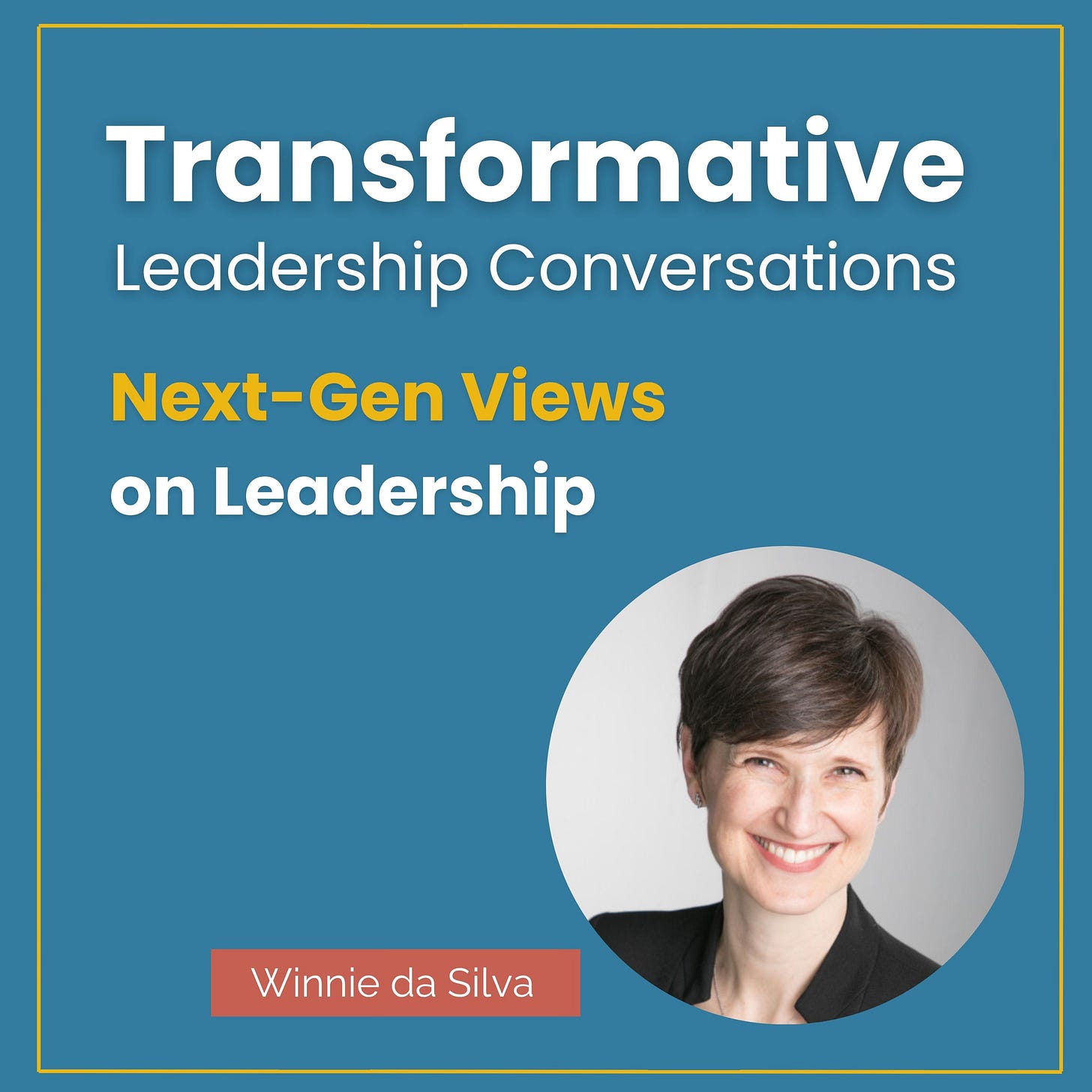

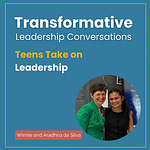
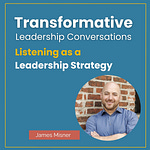
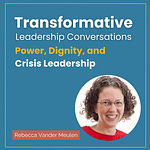

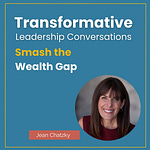
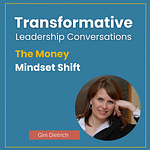

Share this post